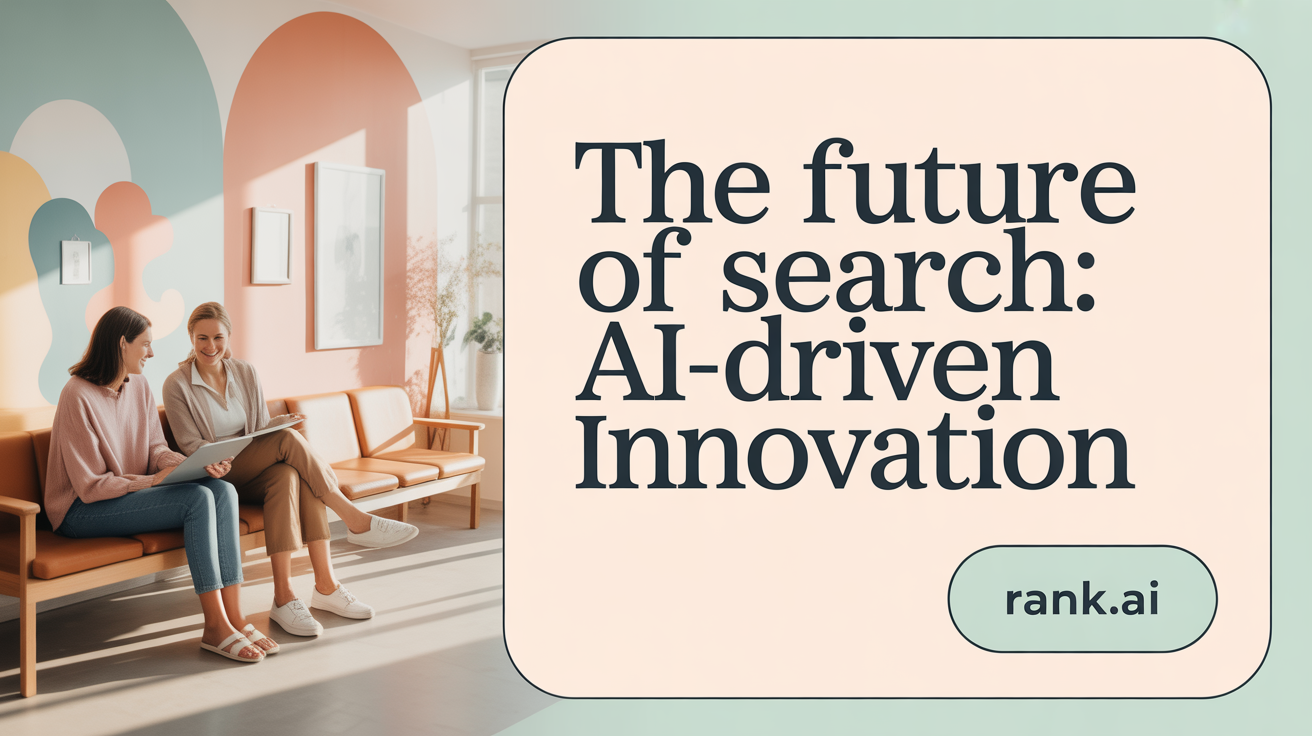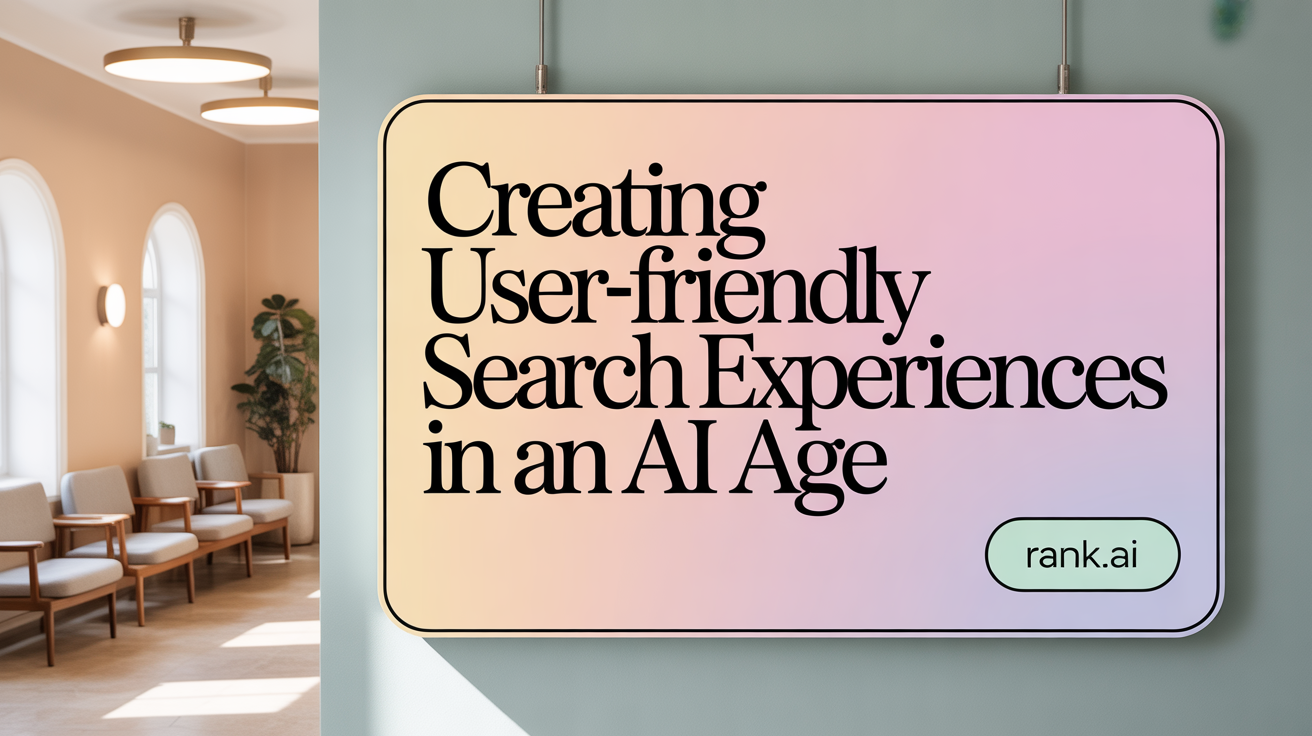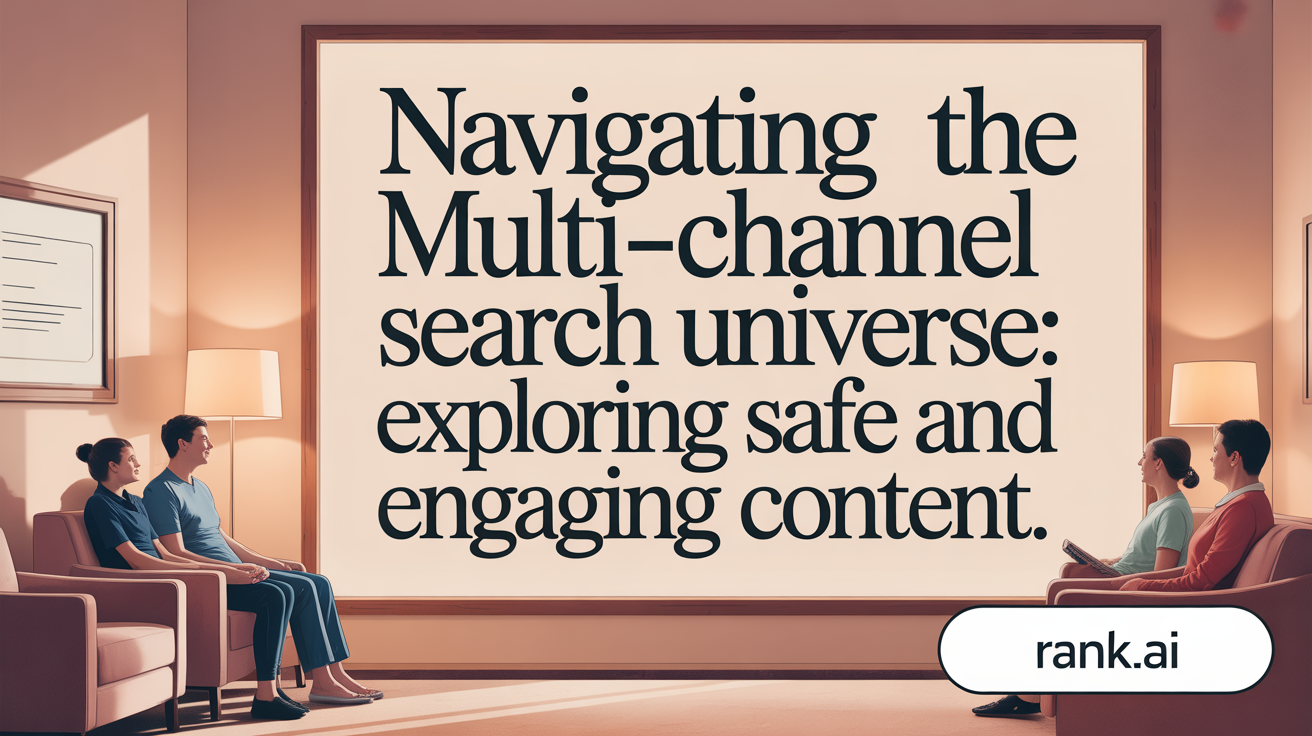Introduction to the AI-Driven Evolution of SEO
Search Engine Optimization (SEO) has long been a cornerstone of digital marketing, ensuring that businesses connect with audiences through improved visibility in search results. However, the advent of artificial intelligence (AI) and changing search behaviors are catalyzing seismic shifts in how SEO operates. This article explores the transformative impact of AI on SEO strategies, highlights emerging trends, and outlines frameworks for adapting to the future search landscape to maintain competitive advantage and connect with users in increasingly personalized and intelligent ways.
What is SEO and Why It Remains Crucial in a Digital World

What is SEO and why is it important?
SEO, or Search Engine Optimization, is the process of enhancing a website’s visibility on search engine results pages (SERPs). With the majority of online experiences starting with a search engine, strong SEO is essential for attracting targeted visitors.
Effective SEO combines optimizing website content, technical setup, and off-site factors such as backlinks to improve rankings. It involves detailed keyword research, crafting relevant and valuable content, ensuring website structure is user-friendly and fast, and earning reputable links from other sites.
In today’s digital landscape, AI-driven search features like Google's AI Overviews and chatbots are transforming how information is ranked and presented. Despite these innovations, SEO continues to be vital because it directly influences a website’s organic traffic and visibility.
Greater visibility leads to higher brand awareness, increased trust from users, and more opportunities for conversions. SEO also supports user experience by providing relevant, well-structured information that matches user intent. As search engines evolve to prioritize quality, authority, and relevance, maintaining a solid SEO foundation is more important than ever.
In summary, SEO helps businesses connect with customers actively searching for their offerings. It remains a core part of digital marketing strategies for sustainable long-term growth and success in an increasingly AI-enhanced search environment.
The Transformative Role of AI in SEO and Search Engine Algorithms
How does AI affect SEO and search engine algorithms?
Artificial Intelligence has revolutionized how search engines understand and rank content, profoundly influencing SEO strategies. Advanced models like RankBrain, BERT, and MUM enable search engines to interpret the meaning beneath keywords, focusing on user intent and context rather than mere keyword matching. This shift toward semantic and intent-based search makes it vital for content creators and SEOs to craft comprehensive, user-focused content that thoroughly answers questions.
AI enhances SEO by automating numerous tasks. Tools like SEMrush, Ahrefs, Surfer SEO, and ChatGPT assist with keyword research, content optimization, technical audits, and trend prediction. These AI-powered platforms analyze vast amounts of data quickly, enabling marketers to identify opportunities, optimize content for relevancy, and improve website performance efficiently.
One significant impact of AI on search results is the rise of features like AI Overviews and AI snippets. Google's Search Generative Experience (SGE), built on AI models such as Gemini, provides instant summaries in search results, reducing the need for users to click through multiple pages. This evolution increases the importance of appearing in featured snippets and establishing trustworthiness to maintain organic traffic.
Moreover, AI models facilitate understanding complex user queries, including natural language and voice searches. With the growing use of virtual assistants like Alexa and Google Assistant, optimizing for long-tail, conversational keywords is more crucial than ever. Local SEO and structured data also become integral, helping AI and voice search systems deliver accurate, contextually relevant answers.
In response to these advancements, SEO strategies must adapt continuously. Emphasizing high-quality, authoritative content, utilizing schema markup, and aligning with evolving AI-driven ranking factors are essential. Overall, AI’s influence sets a new standard for search relevance, personalization, and efficiency, making it imperative for businesses to stay informed and agile to thrive in this intelligent search ecosystem.
Future Outlook: How AI is Shaping the Next Phase of SEO and Search

What is the impact of AI on the future of SEO and search?
AI is transforming how we search and how content is optimized. With advanced algorithms like Google BERT, RankBrain, and new models such as Google Gemini and Bing’s integration with ChatGPT, AI enables a much deeper understanding of user intent. Instead of relying solely on keywords, search engines now prioritize high-quality, intent-driven content that answers complex questions in a natural, conversational manner.
This shift is making SEO more focused on relevance, user experience, and engagement metrics such as dwell time and click-through rate. AI tools like Semrush, Surfer SEO, and Jasper help content creators perform detailed keyword research, optimize technical elements like schema markup, and generate compelling content efficiently. Additionally, AI-generated summaries and answer snippets—seen in features like Google’s Search Generative Experience—provide instant, relevant answers, reducing the need for users to click through multiple links.
However, alongside these benefits, challenges have emerged. Misinformation and AI hallucinations—errors in AI outputs—underscore the importance of human oversight. Ensuring content remains trustworthy and aligns with EEAT (Experience, Expertise, Authority, Trustworthiness) principles is vital for maintaining credibility.
Overall, AI’s influence on SEO and search is profound and ongoing. The future of search involves a blend of sophisticated AI-driven features, high-quality content optimized for both humans and machines, and consistent human involvement to uphold accuracy and authority. To stay competitive, businesses must embrace AI-enabled strategies while safeguarding content integrity and trustworthiness.
Emerging SEO Trends in the Era of AI Integration
What are the emerging SEO trends related to AI integration that businesses should be aware of?
As AI continues to reshape the digital landscape, several emerging trends are now essential for businesses to understand and incorporate into their SEO strategies. One of the most noticeable shifts is the rise of voice and visual search optimization. This trend requires creators to produce content that suits conversational language, long-tail keywords, and visual elements like images and videos optimized for AI recognition tools.
Alongside these changes, advanced AI-powered tools such as ChatGPT, Surfer SEO, and MarketMuse are transforming how marketers approach keyword research, content creation, and site performance analysis. These platforms enable more precise targeting, real-time content optimization, and automation, making SEO efforts more efficient and data-driven.
Google and other search engines are heavily integrating AI models like BERT, MUM, and their version of Search Generative Experience (SGE). These models help search engines comprehend user queries more deeply and contextually, shifting the focus from traditional keyword matching to understanding the intent behind searches. Consequently, search results now include AI-generated answer engines, summaries, and interactive snippets that aim to deliver instant, relevant information.
This evolution diminishes the importance of rankings based solely on keywords. Instead, SEO strategies must prioritize relevance, user engagement, and trustworthiness. Signals such as click-through rate (CTR), dwell time, and page speed are now critical indicators of content quality, supported by structured data and E-A-T principles (Expertise, Authority, Trustworthiness). Using schema markup and creating authoritative content will become even more vital as search engines favor credible sources.
Furthermore, as organic traffic shifts toward answer engines and zero-click searches, brands need to adapt by increasing their presence in featured snippets and direct answer blocks to maintain visibility. High-quality, original content aligned with ethical AI use and transparency remains central to sustaining authority and organic reach.
In summary, businesses must develop a hybrid SEO approach—optimizing for both traditional ranking factors and AI-driven features—to stay competitive in the rapidly evolving AI-enhanced search ecosystem.
Strategic Adaptations: Aligning SEO with AI Advancements and Evolving Search Behaviors
How can businesses adapt their SEO strategies to align with AI advancements and the evolving search landscape?
To stay competitive in the rapidly changing SEO environment influenced by AI, businesses need to focus on a holistic, forward-thinking approach. First, creating high-quality, user-centric content that addresses search intent, especially conversational and long-tail queries, is crucial. As AI models favor helpful, authoritative sources, content should be thorough, clear, and structured around solving user problems.
Leveraging AI tools for keyword research and content optimization can significantly enhance efficiency. Platforms like Semrush, Ahrefs, and Surfer SEO help identify relevant topics, analyze competitor strategies, and optimize content for semantic relevance. These tools enable marketers to adapt quickly to changing algorithms that prioritize understanding user needs over simple keyword matching.
Implementing structured data and schema markup plays a vital role in making content AI-friendly. Schema helps search engines better interpret your site’s content, which can improve visibility in rich snippets, answer boxes, and voice search. Proper markup also enhances the chances of being featured in AI-generated overviews, thereby increasing exposure.
Continuous data analysis is essential. Monitoring performance metrics tailored for AI-driven search—such as content relevance, click-through rates, and engagement signals—guides strategic updates. Adjusting content and technical SEO based on AI insights ensures your site remains aligned with search engine expectations.
Building and maintaining brand authority and trustworthiness are fundamental. Contributing credible content, earning media mentions, and obtaining backlinks from trusted sources increase your chances of ranking well in AI-optimized results. Establishing expertise and transparency supports the E-E-A-T principles favored by search engines.
Overall, integrating AI tools into your SEO workflows, consistently analyzing AI-driven metrics, and focusing on authentic, user-first content form the backbone of sustainable SEO practices in a future increasingly dominated by AI-powered search.
Challenges and Ethical Considerations of AI Utilization in SEO
The integration of AI in SEO brings numerous opportunities, such as automating content creation, enhancing data analysis, and predicting emerging trends. AI-powered tools help marketers optimize keywords, improve site performance, and deliver personalized experiences efficiently. However, this technological advance introduces several challenges and ethical issues that must be carefully managed.
One major concern is the risk of over-reliance on automation, which can lead to a decline in content quality and originality. AI-generated content, if not properly overseen, may result in low-value or misleading information that harms user trust and violates search engine guidelines.
Addressing misinformation and AI hallucinations is another pressing challenge. AI models sometimes generate inaccurate or fabricated information, known as hallucinations, which can spread falsehoods if used irresponsibly. Ensuring the factual accuracy of AI outputs is essential to maintain credibility.
Transparency plays a critical role in ethical AI use. Marketers and content creators should clearly disclose when content is generated by AI to foster trust with users. Concealing AI involvement can lead to suspicion and damage the brand’s reputation.
Algorithmic bias and user privacy are also significant concerns. AI systems may inadvertently reinforce existing biases present in training data, resulting in unfair or discriminatory search results. Moreover, AI tools often process large volumes of personal data, raising privacy issues, especially under regulations like GDPR.
Compliance with legal standards and intellectual property rights must be prioritized. Using AI to duplicate protected content or violate copyright laws can result in legal repercussions. Brands should ensure their AI practices adhere to relevant laws and respect creators’ rights.
Human oversight remains crucial in maintaining integrity and trustworthiness. Experts should regularly review AI-generated outputs, verify their accuracy, and ensure alignment with societal values and ethical standards. This prevents misinformation and maintains the credibility of SEO efforts.
In summary, while AI enhances SEO capabilities significantly, addressing the ethical considerations—such as quality control, transparency, bias mitigation, privacy, and legal compliance—is vital. Responsible AI deployment ensures that technological benefits are harnessed ethically, boosting both search performance and user trust.
Developing Intentional Search Experiences (ISEs) in an AI-Driven Environment

What strategies can be employed to develop Intentional Search Experiences (ISEs) in an AI-driven search environment?
Creating meaningful and effective search experiences that align with user intent involves several strategic steps. First, it is essential to understand the diverse and evolving nature of search intents. These include informational, transactional, navigational, and even emerging types like problem-solving and brainstorming. Collecting comprehensive search data and analyzing user behavior helps delineate these intents more clearly.
Next, optimizing site structure and content quality is crucial. Well-organized site architecture with clear navigation, combined with high-quality, user-focused content, helps meet specific user needs. Incorporating technical SEO elements such as schema markup and fast-loading pages supports better indexing and enhances visibility in AI-driven search results.
Leveraging advanced AI technologies plays a significant role. Natural Language Processing (NLP), machine learning, and deep learning enable search engines to interpret and classify complex queries. These tools facilitate more accurate understanding of user intent and allow for the delivery of tailored responses.
In addition, structuring data effectively with schema markup and utilizing visual-rich features like images, videos, and answer boxes improve the presentation of search results. These features align with user expectations for immediate, relevant information and increase engagement.
Conversion Rate Optimization (CRO) strategies, such as designing compelling calls-to-action and optimizing for higher click-through rates (CTR), further refine the search experience. Monitoring key metrics like engagement, dwell time, and bounce rates provides insight into user satisfaction and areas for improvement.
Finally, continuous adaptation to AI trends—such as the increased importance of voice search, mobile-first indexing, and personalized multi-device experiences—is vital. Regularly analyzing performance data and staying informed about advancements ensures that search experiences remain relevant, engaging, and effective, positioning brands competitively in an evolving search landscape.
Leveraging AI Tools to Enhance SEO Effectiveness and Efficiency

How is AI being used for keyword research, competitor, and trend analysis?
AI-driven tools like Semrush, Ahrefs, and MarketMuse leverage natural language processing (NLP) to analyze vast datasets quickly. They identify relevant keywords based on user intent, uncover competitors' strategies, and predict trending topics before they peak. These insights enable SEOs to target high-potential keywords and stay ahead in competitive markets.
How can SEO professionals automate content generation and optimization?
AI content platforms such as Jasper, Copy.ai, and Frase assist in drafting articles, meta descriptions, and FAQs efficiently. They use AI models like GPT-4 to produce human-like content that aligns with targeted keywords and user intent. Automation accelerates content creation, ensures consistency, and frees time for strategic tasks.
How does AI help monitor search performance through analytics?
AI-powered analytics tools like BrightEdge’s Data Cube and SEMrush’s SOV measurement analyze user engagement, keyword rankings, and site health. They provide real-time reports, predictive insights, and alerts on SEO opportunities or issues, helping marketers adapt swiftly and optimize campaigns for maximum ROI.
In what ways does AI improve technical SEO audits?
AI tools such as DeepCrawl and Screaming Frog deploy machine learning algorithms to identify site issues, such as crawl errors, page speed bottlenecks, and schema implementation gaps. They offer prioritized action plans, ensuring technical aspects of SEO are optimized, which is vital for AI-enabled search engines that favor well-structured sites.
What are some popular AI SEO tools and what capabilities do they offer?
| Tool | Capabilities | Example Uses |
|---|---|---|
| Semrush | Keyword research, site audit, trend analysis | Identifying keyword gaps, competitor benchmarking |
| BrightEdge | AI-driven content optimization, performance tracking | Monitoring search visibility, content suggestions |
| Frase | Content brief creation, FAQ optimization | Drafting content outlines aligned with search intent |
| ChatGPT | Content creation, meta tagging, FAQs | Generating blog ideas, optimizing snippets |
| Surfer SEO | On-page SEO, keyword density, content scoring | Improving page rankings through precise optimization |
These AI tools are transforming traditional SEO workflows, making them faster, more accurate, and highly scalable. Incorporating them into your strategy helps to maintain competitiveness in an evolving search landscape.
Voice and Visual Search: New Frontiers in AI-Driven SEO
How is the growth of voice search and conversational queries transforming SEO?
Voice search is rapidly expanding, with over 65% of adults using voice-enabled devices daily. Users prefer natural language and conversational questions, which are different from traditional keyword searches. This shift pushes SEO strategies toward optimizing long-tail keywords and creating content that answers questions more naturally.
Why is optimizing for natural language and long-tail keywords essential?
Search engines like Google and Bing now prioritize understanding context through advanced natural language processing. Content that matches conversational queries increases chances of appearing in voice search results. Focusing on long-tail keywords helps capture specific user intents, improving visibility in AI-powered searches.
What role does local SEO play in voice search?
Since many voice searches are location-specific, optimizing for local SEO is crucial. This involves updating business listings, maintaining accurate contact information, and gathering positive reviews to appear confidently in local voice search results. Local SEO ensures that nearby users find your business when asking for services or products.
How does AI-powered visual search work?
AI-driven visual search techniques, such as Google Lens, recognize objects, products, and images in real-time. Users can snap a picture or upload an image to discover related products, get more information, or find similar items. This technology enhances e-commerce and content discovery, making search more intuitive.
Can you give examples like Google Lens and product discovery?
Google Lens allows users to scan images for instant data, such as identifying landmarks, translating text, or shopping for products directly from photos. In retail, visual search enables customers to upload images of items they like and find similar products online, increasing engagement and conversion.
By leveraging these AI-powered functions, businesses can optimize their content for the future of search, ensuring they remain visible across diverse and evolving platforms.
Technical SEO’s Growing Importance in an AI-Enhanced Search Ecosystem
Role of schema markup and structured data
As AI-driven search tools become more sophisticated, implementing schema markup and structured data on websites is crucial. These technical elements help search engines and AI models understand your content’s context, enhancing visibility in rich snippets, voice search, and AI-generated overviews. Using common schemas like FAQs, products, and articles allows AI to accurately interpret and feature your content, improving your chances of appearing in enhanced search results.
Core Web Vitals and website performance
Performance remains a foundational aspect of SEO, especially in an AI context. Core Web Vitals focus on loading speed, interactivity, and visual stability. Fast-loading pages not only improve user experience but are favored by AI algorithms that prioritize user engagement signals like dwell time, bounce rates, and page load times, which directly influence rankings.
Site architecture optimized for AI readability
A well-structured site architecture facilitates better understanding by AI models. Clear hierarchical organization, logical URL structures, and modular content help AI parse information efficiently. Internal linking strategies that connect related pages enhance topical relevance, aiding AI in delivering accurate, relevant answers to user queries.
Mobile-friendliness and speed enhancements
With the surge in voice and mobile searches, optimizing for mobile devices is more important than ever. Responsive design, fast-loading pages, and optimized images contribute to a seamless mobile experience. These improvements are rewarded in search rankings and are vital for AI systems that prioritize quick, accessible information delivery.
Semantic content organization and internal linking
Organizing content semantically through relevant headings, topics, and keyword clusters improves AI’s ability to understand and retrieve your content effectively. Internal links connecting related pages create a web of authoritative signals, helping AI models assess content relevance and authority, boosting overall SEO performance in an AI-infused search landscape.
Adapting to a Multi-Channel and Decentralized Search Landscape

Influence of social media and content platforms on search behavior
In today’s digital environment, social media platforms like TikTok, Instagram, and YouTube are not just channels for entertainment; they are rapidly becoming central to search. These platforms facilitate discovery and brand engagement, especially among younger audiences such as Gen Z. Many users now turn to social media bars for quick answers, product reviews, and recommendations, effectively acting as search engines themselves.
This shift means that brands need to optimize not just for traditional search engines but also for social search. Creating shareable content, leveraging hashtags, and engaging consistently across these platforms helps improve visibility and influence search outcomes across multiple channels.
Rise of zero-click searches and featured snippets
Zero-click searches occur when users find all the information they need directly on the search results page, thanks to AI-generated overviews, featured snippets, and knowledge panels. Google’s AI features like Search Generative Experience (SGE) list citations and summaries that satisfy user intent without requiring a click.
As a result, the importance of optimizing for featured snippets and position zero increases. Marketers must craft concise, authoritative content formatted as lists, Q&A, or summaries that Google’s AI can easily extract and display.
Balancing SEO efforts across traditional and AI-driven platforms
While AI-driven features reshape search results, traditional SEO remains vital. Ranking high in organic results, developing authoritative content, and earning genuine backlinks still play crucial roles. Businesses should aim for a balanced approach: optimize content for AI features while maintaining a solid foundation in conventional SEO practices.
Integrating structured data, improving site speed, and enhancing mobile usability support both strategies, ensuring content is accessible to AI algorithms and traditional crawlers alike.
Importance of brand authority across channels
Authority and credibility now influence AI-driven search as models favor trusted sources. Consistently demonstrating expertise, sharing accurate information, and gaining reputable mentions build authority that benefits visibility on all channels.
This authority is crucial in voice search and AI snippets, where Google's models prefer well-established brands and sources, making trust signals like E-E-A-T (Experience, Expertise, Authority, Trustworthiness) more important than ever.
Content format diversification: video, audio, and interactive media
To succeed in a multi-channel ecosystem, content needs to be versatile. Video content, podcasts, interactive infographics, and augmented reality experiences enhance engagement and meet diverse user preferences.
AI-powered tools help create and optimize these formats for search. For example, transcripts and descriptive alt text improve accessibility and AI comprehension, increasing chances of appearing in rich results or voice search.
By diversifying content formats, brands can maximize their reach across platforms, cater to different search behaviors, and ensure their presence is felt in both traditional and AI-driven search experiences.
| Aspect | Description | Impact on SEO Strategy |
|---|---|---|
| Social Media | Large influence on discovery and influence | Focus on shareability, hashtag optimization |
| Zero-Click Search | Direct answers reduce website traffic | Optimize snippets, structured data |
| Traditional SEO | Foundation for authority | Continue link-building, quality content |
| Brand Authority | Builds trust and AI favor | Maintain consistent E-E-A-T signals |
| Content Formats | Video, audio, interactive | Diversify to reach multiple platforms |
In this evolving landscape, adopting a multi-channel SEO approach ensures brands stay visible and relevant across all search environments, powered by AI, social media, and traditional methods alike.
Conclusion: Embracing AI to Future-Proof SEO Success
As AI continues to reshape search behavior and SEO practices, businesses must evolve beyond traditional optimization techniques to embrace intelligent, user-focused strategies powered by artificial intelligence. Prioritizing high-quality content, technical excellence, and ethical AI use, while leveraging advanced tools and data-driven insights, will be essential to thrive in a complex, multi-channel search ecosystem. Developing Intentional Search Experiences and adapting quickly to emerging trends such as voice, visual, and conversational search can unlock new opportunities for engagement and visibility. Ultimately, the future of SEO is a collaborative partnership between human creativity and AI capabilities, ensuring relevance, trust, and competitive advantage in an ever-evolving digital landscape.
References
- The Future of SEO: How AI Is Already Changing Search Engine ...
- How AI Is Transforming The Future Of SEO - Forbes
- The Future of SEO: Stay Visible as Search Evolves - Salesforce
- The Future of SEO & AI: Adapting to Intentional Search Experiences
- The Future Of SEO | How A.I. Is Changing The Search Game
- How AI is reshaping SEO: Challenges, opportunities, and brand ...
- The Future of Search: SEO and AI Impacts Explained
- How AI Mode Works and How SEO Can Prepare for the Future of ...



